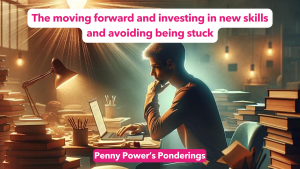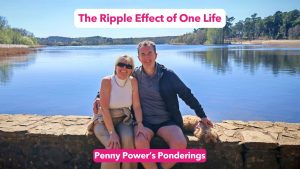Now that you have (possibly) read my 8 articles within this Newsletter Series on the subject of ‘Community Led Growth, you may already get a sense that community is a powerful force for wellbeing. The subject of wellbeing is on the tip of everyone’s tongues, and we all have our own language and motivations around this. There are so many aspects to our human state and the balance we seek in our wellbeing.
I shared last time that, in this article, I will share more about why I believe that ‘community is a mental wellbeing’ strategy within a company, and how in a hybrid world it could be the solution to many organisational issues, especially since the pandemic and the change in workforce dynamics. It will also be a cure to the 2 years of separation and challenges that the pandemic created, reigniting people, purpose, missions, and togetherness.
To begin this thought process, let me share that I believe ‘self-empowerment’ is a fundamental part of our success, to take responsibility for how we feel, the life we lead and the choices we make. Communities can only be as powerful as the citizens and their commitment to the ‘community’. Self-empowerment is also a core cultural need, and must be encouraged.
I recall a terrible time in my business life, when my colleague noticed that I was unhappy, no matter how hard we might try, it can be hard to hide this all the time. My unhappiness was chronic, and was business based. I had an Investor in a business that was the wrong person to go into business with, and as it was their first ever investment, they treated me more like an employee rather than the Founder of a business that I knew how to steer. Managing this for over three years and the control they had over me was debilitating and was impacting me greatly.
My colleague said this to me ‘Penny, there has been research into ‘happiness’ and the global study identified 3 parts of happiness, together they sum up to 100%.’
1. Your own constitution, are you naturally a happy person – 50%
2. Your ability to achieve the things you want – 10%
3. How much control you feel over your life, your future, and your activities – 40%
I believe that most of us are basically happy, it is events that can impact this, I am also aware that as advanced animals, us humans will always seek more out of life, this is what makes us, and society advance, innovate and grow. Control over our life and decisions, and that sense of empowerment, can fluctuate, and this is 40% in the study of what makes up our happiness. I really felt his words, they made so much sense. I had lost ‘control’ of my business, beliefs and strategy, and my time and decisions. It was at this point that I decided to ‘positively surrender’ from the business I loved, I could not change the ‘control’ this person had over me and I could not change the impact it was having on me, therefore, it was time to exit. Thankfully, an exit for the company was achieved, however, I always think back and wonder, what if I had been able to have the wings I needed, how different would the outcomes be, if they had trusted me and allowed me to execute the business in the way I had seen when I Founded it. Selling the business took time, however, once my decision was made, and I learned to assert myself again, I found my ‘true self’, my confidence and hope return.
The reason I share this, is that I believe our wellbeing is our own responsibility, and on occasions, we lose the ability to see what is really happening around us, and we can become victims of circumstances, rather than the ‘warrior; the strong, unstoppable, positive person we want to be. I learned this through life experiences, not from innate wisdom. Sometimes you must go through adversity to flex, perhaps even find a new muscle, and fine tune it. The skills of self-awareness and knowing your own triggers can be very powerful in helping you direct time and effort into the right challenges you face. Fundamental to self-empowerment is to find the culture in an organisation where we can be our ‘true-self’, where empowerment and having a voice is part of the beliefs and philosophy of the leadership and culture.
While ‘self-empowerment’ and ‘unstoppable’ attitudes within us all can be our own personal choice we do need to be within the cultures that enable this too. We need to feel safe, we need that sense of shared belonging and family, we need to know we are respected and loved, to perform in this way. It is easy for organisations to silence people, to disempower them and to fail to listen or to encourage innovation. It is the responsibility of the ‘leadership’ within a company to ensure that their staff are working within a psychologically safe and loving environment, love and belonging is a human need and it doesn’t stop when we start our working day, it is a need we have, and we cannot turn it on or off.
One of the most painful human conditions is the challenges related to ‘loneliness’. A sense that we don’t really matter to anyone, that our words aren’t heard, that no one listens or knows us, despite our presence. This can hit us at many times in our life, in many ways. It can be very debilitating. Sucking our energy, reducing our motivation, impacting our self-worth, damaging our confidence, impacting our productivity; anyone who has felt loneliness, can add many other emotional, wellbeing challenges from this human need when it is not met.
Loneliness in business is not a new thing, however, the pandemic and the emergence of hybrid working has massively grown the issue of loneliness. It can take huge swings in the wrong direction to create change, and this is the time when I know communities will emerge, a cure will be found for an issue that has been boiling up for many decades, thanks to the pandemic, this has now become urgent.
My focus is on the holistic aspect of business people, we are all people, we are human. We cannot separate ourselves into two, our ‘home life Penny’, and our ‘work life Penny’ Our emotional energy and our emotional state are critical to our business survival, stability, and growth. I have had the pleasure of spending time with a fabulous Leader, Gary Headland, from Activate Learning, over a deep conversation with me, he shared that “many organisations are all too prepared to accept ‘good enough’ in business but imagine if we encouraged exceptional”. So how do we reach ‘exceptional’, I believe that is through love, belonging and caring deeply about our stakeholders, and that goes far beyond the tasks they perform.
The loneliness and isolation of being a leader, being a business owner, of being a member of a team can tear at us. However, some people don’t even know that it is a problem. Many business owners are hugely independent and closed in their behaviour, and that, for them, is a strength, it keeps them focused, separating their home life, polarising their identity from their true being, separating any challenges from their work life and their home life, they have decided to walk a path with courage, determination, and tenacity. This strength, however, can become an ‘overdone strength’, working against them, in ways that they may not have identified. Worse still, this ‘leadership style’ encourages this separation for everyone, and it separates everyone.
I have been an entrepreneur that suffered loneliness, overwhelm, fear, scarcity, self-worth issues, motivation drag, and it was at a time when I had a lot of connections, and an identity online, however, very few people knew me, the real me. This was not a conscious decision of mine to hold an identity that was not real, the issue was the conflict of ‘the brand Penny’ and the real me, who had experienced adversity, come through it, but wore the scars. It was through this that I learned that my adversity was my superpower, my place of empathy and passion, I was someone who wanted close connections that I could trust and know that my vulnerabilities would not be exploited or damage my ability to earn a living. I discovered I was not alone in this need, nor was I alone in the life journey we all have and the adversity each of us face and come through, the true warriors in life, whom, when given permission to be that honest, real person in business, brings more to the business than just their skills, they bring love, commitment, passion and become the most amazing citizens of a community. It is the energy from each person within a community that creates the whole, a massive power of energy, where people love to work, share the same desires and motivations for success and know that they matter, individually, their presence, for who they are as well as their capabilities, matter to everyone.
At one point, during my ‘recovery period’, I stated to someone that I had lost trust in people, and he replied, ‘perhaps you have lost trust in yourself first’. That is a sentence that I remember so well, one of those lightbulb moments, that made me realise I had to do something about the lack of community, of real, good people around me. People I could respect, like, hang out with and be ‘Penny’ not Penny Power OBE. Having left the world of ‘community’ in 2012, after the devastation of Ecademy coming to an end, it was time to revisit community, we all need it, technology has destroyed this in business, and it has left too many people feeling lonely.
So how many of us seek that feeling, that desire to be a whole person, not just the business persona that we have? This is why building community can be the most powerful thing to do for your clients, stakeholders, staff, or followers.
I am not talking about anything new, citizenship, social capital, communities, these are as old as man. Yet, many people have lost the art of spending time with others without seeking an outcome. The ‘hunters’ that seek a network to hunt down clients within, the ‘salesperson’ that just cannot take time to build their social capital and reputation. The Leader that enters a room seeing a group of people that are there only to perform tasks. Building community is not a distraction, it is the waterhole, the place to share, to care and to be heard.
Running a community is like a lesson in anthropology, witnessing the human behaviours of people when they interact. The diversity of communication, the choices made, the investment of time in people and in themselves. The desire for belonging and love, often found within those that might be least expected.
If you build a community in the right way, you will be amazed at the ‘wellbeing’ you create without overtly providing it. It is the culture and the servant leadership style that creates the permission for love and belonging, and as Maslow states in his brilliant book ‘The Theory of Human Motivation’, “our need for love and belonging is a hunger, “he will hunger for affectionate relations with people in general, for a place in a group.” And once found, settled, and enjoyed, this stable base will then give rise to self-esteem and respect from others.
We all know that business is a mind game, to manage the voice inside, to drive ourselves to achieve, to know our thoughts matter, to gain a sense of success, whatever the personal definition of success is, being part of a community can provide the space for inclusion, diversity, innovation, motivation, kindness, love and belonging. What comes next from this ‘emotional wealth’ is the ‘financial wealth’ that business leaders seek, this shift increases energy and through that productivity rises, the social capital gained and the innovations that come from knowing people in a far deeper way builds an organisation far more sustainably and successfully than any ‘task based leadership and culture’ can provide.
In the next Newsletter, I am going to share the 3 elements of ‘community led growth’
1. Philosophy
2. Community
3. Citizenship
*This blog first appeared in my LinkedIn newsletter.




